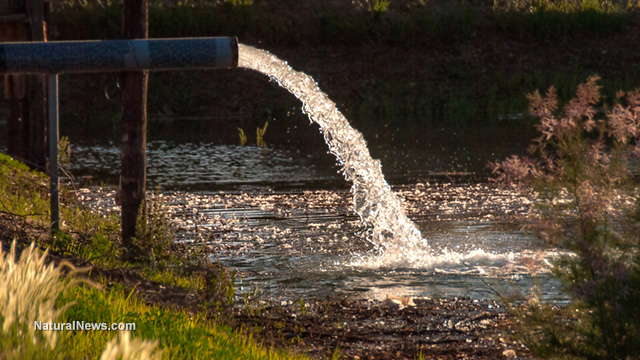Wastewater rapidly poisoning vegetables with heavy metals
Tuesday, September 27, 2016 by: Vicki Batts
Tags: heavy metals, vegetables, wastewater

(NaturalNews) Could poo irrigation techniques be causing heavy metals to build up in produce? New research indicates that irrigating agricultural land with wastewater leads to an accumulation of heavy metals in the soil, which in turn leads to heavy metals in the food supply.
Recently published by a group of researchers from India, the study found that vegetables grown in soil that was in the vicinity of wastewater drainage areas were not fit for consumption. The researchers found that tuberous and leafy vegetables posed the greatest risk and had the highest hazard quotients across the board, regardless of irrigation techniques. The researchers also stated: "Spinach was the most hazardous among all as the hazard quotient with respect to cobalt and copper was highest in spinach."
One of the key issues is that while the wastewater itself may not seem alarmingly high in heavy metals, these levels become concentrated after reaching the soil. The buildup is essentially continuous; every time the soil is watered with wastewater, more heavy metals are added. As industrialization continues to spread and populations continue to skyrocket, many countries have turned to recycling wastewater as a means of conserving resources. Unfortunately, while this is effective, the lack of proper filtration has also led to an increase in human consumption of heavy metals worldwide. The researchers write: "Long term use of wastewater for irrigation can cause accumulation of these metals in soil which can be further translocated to food crops and thus enter food chain."
The researchers state in their conclusion that while several servings of vegetables should be included as part of a healthy diet, "injudicious agricultural practices" make this seemingly healthy choice a serious threat to human health. The study authors suggest that consumption of tuberous and leafy vegetables from wastewater sites, or sites within wastewater drainage vicinity, should be avoided. The researchers also note: "[T]hese sites should be used for cultivation of non-food crops."
This is not exactly a new finding. The problems associated with wastewater contamination of soil have been an ongoing issue. A 2013 report from the European Commission notes that many countries use wastewater to irrigate farmland under the guise of environmental benefits. They say that in addition to economically solving the issue of what to do with wastewater, it also helps to "enrich" the soil. Unfortunately, they are "enriching" the soil with toxins, heavy metals and who knows what else.
Research conducted in crop-growng regions of Greece revealed that vegetables grown near contaminated portions of riverbeds also showcased excessive amounts of heavy metals. The report states: "Chromium levels in food were twice as high in areas where the water bed was polluted by heavy metals, compared to non-polluted areas. In the same polluted areas, nickel levels were nine times higher than in non-polluted areas."
As Mike Adams, the Health Ranger, has previously reported, toxic levels of heavy metals do not naturally occur in fruits, vegetables and other crops. They appear there because of what is being dumped into the soil. Adams has built an independent, certified lab and tested a wide array of fruits, vegetables and other foods for a spectrum of heavy metals, including both lead and cadmium. Foods that are grown in clean soil exhibit very little to almost no traces of harmful heavy metals. There is no excuse for food to literally be inedible because it is toxic and laden with heavy metals.
Sources:
Springer.com
EC.Europa.eu[PDF]
NaturalNews.com
Heavy metals at FETCH.news
Get independent news alerts on natural cures, food lab tests, cannabis medicine, science, robotics, drones, privacy and more.
Take Action: Support Natural News by linking to this article from your website
Permalink to this article:
Embed article link: (copy HTML code below):
Reprinting this article:
Non-commercial use OK, cite NaturalNews.com with clickable link.
Follow Natural News on Facebook, Twitter, Google Plus, and Pinterest
- Newly released JFK files reveal Pentagon's role in creating Lyme disease and covid in the same lab
- The hidden dangers in your kitchen: How cooking methods impact diabetes, cancer and aging
- DEADLY DECEPTION: How COVID vaccines increased mortality rates and why authorities hid the truth
- CDC finally halts $11 billion COVID funding scam as health officials admit the ‘pandemic’ was a fraud
- Arkansas embraces medical freedom with landmark ivermectin law
- GAIN-OF-FUNCTION CAT-BIRD-FLU now on the rise as nearly a dozen cats in Colorado "test positive" for Bird Flu due to contaminated cat food
- Lab leak confirmed? Boris Johnson's stunning reversal on COVID origins sparks global debate
- Home gardening for preppers: A beginner's guide to growing your own food
- Unraveling the paradox: Why intelligent individuals fall prey to everyday blunders
- Cartels shift tactics: Kidnappings and organ trafficking surge as border crossings plummet under Trump policies
- Why you should think twice before buying mainstream toothpaste formulas
- Was JFK's assassination orchestrated by a CIA double agent? New evidence points to James Angleton as the “architect”
- Trump's greatest betrayal so far: Accelerating Middle East wars, silencing dissent, and serving Zionist masters
- Key nodes of Federal Government censorship
- ATTENTION PRESIDENT TRUMP: Please WITHDRAW your nomination of Dr. Susan Monarez for CDC Director as she is a VAX FANATIC and TOXIC JAB ZEALOT
- “Rent-a-womb” scandal: How China is exploiting U.S. birthright citizenship for long-term espionage
- Record honeybee deaths devastate U.S. agriculture, pesticides under scrutiny
- Speaker Johnson warns Congress may defund or disband rogue courts targeting Trump
- Newly released JFK files reveal Pentagon's role in creating Lyme disease and covid in the same lab
- Elon Musk: Aliens could be here on Earth RIGHT NOW
- Festive flavors: The sweet history, nutritional profile and health benefits of pecan pie
- Trump reverses course on Gaza plan, says “nobody is expelling Palestinians”
- Reclaim your health: How midlife exercise reverses years of inactivity
- Big Pharma's $8 Billion bribery scheme exposed: how doctors are pushed to prescribe junk science, not heal
- Boys are back in town: Trump’s patriotic alpha crew takes the wheel while toxic females ride in the backseat
- EPA advisor admits the agency is funneling billions to climate groups ahead of Trump’s return to White House
- Space war brewing? Russia threatens to destroy Starlink satellites
- Survival 101: Effective EMF blocking techniques
- A lack of integrity in Academia: Harvard professor found GUILTY of fraudulent research to promote CRT theory
- Mike Adams Sermon 66: God will DESTROY ISRAEL for its wickedness
- 5 Simple steps to boost your brainpower: How to strengthen executive function in a distracted world
- Rep. Nancy Mace introduces bill to ban biological males from female facilities on federal property
- Sugarcane extract superior to cholesterol-lowering drugs?
- WHO focusing more on policing speech about public health and implementing global surveillance systems
- Pilots report mysterious lights 'moving at extreme speeds' across Oregon skies
- Dr. Mike Yeadon releases 15-minute testimony - WATCH - about genocidal intent of COVID “vaccines”
- EPA advisor admits the agency is funneling billions to climate groups ahead of Trump’s return to White House
- The Health Ranger releases “Vaccine Zombie” song and music video, using AI-animated zombies for the music video
- California's social media censorship law struck down: A victory for free speech or a threat to online safety?
- Dr. Mike Yeadon releases 15-minute testimony - WATCH - about genocidal intent of COVID “vaccines”
- The pandemic as a tool for INDOCTRINATION: Understanding “The Indoctrinated Brain” by Dr. Michael Nehls
- Florida takes a stand: DeSantis proposes permanent ban on mRNA vaccine mandates
- Mike Adams releases country western hit single: Goin’ Back in Time is Comin’ Home
- Mike Adams releases music poetry sensation: A Child of God
- “Why we influenced the 2020 elections”: Facebook files reveal the coordinated effort to bury the Hunter Biden laptop story
- RFK Jr. clears key hurdle: Sen. Susan Collins backs controversial HHS nominee, signaling a new era for health policy
- Unpacking the Lies That We’ve Been Fed – new song and music video released by Mike Adams, the Health Ranger
- Mike Adams releases new song and music video: Nothing More Disgusting Than a Globalist
- Newly released JFK files reveal Pentagon's role in creating Lyme disease and covid in the same lab
- Congratulations to the FULLY UNVACCINATED as you resisted the COVID-19 PROPAGANDA MACHINE fueled by over $100 BILLION
- Michigan sheriff announces criminal investigation into 2020 election crimes, Dominion Voting Systems
- Israeli soldiers accused of even more torture and abuse in the West Bank
- Migrants are taking advantage of recent hurricanes to scam residents and loot their homes
- House Intelligence Committee calls for the ARREST and PROSECUTION of Dr. Anthony Fauci
- Red Cross issues warning to stop blood plasma donations from vaccinated people
- Scientists confirm: GENIUS brain function can be spontaneously unleashed in humans without any apparent cause
- EPA advisor admits the agency is funneling billions to climate groups ahead of Trump’s return to White House
- HYSSOP: What research reveals about the health benefits of this ancient holy herb
- Two containers with completed ballots fall out of truck in Florida
- Fully vaccinated about to see “tsunami” of illness and death, warns virologist
- Global leaders unite to clamp down on “misinformation” with UN-backed Cascais Declaration
- BREAKING: 2025 NDAA authorizes mandatory military draft of WOMEN across America… as Pentagon pursues global NUCLEAR war with both Russia and China at the same time
- Michael Yon warns of a ZIONIST TAKEOVER in Trump’s second administration
- BOMBSHELL: DNA testing kits are a SCAM to develop ethnic-specific bioweapons
- Ozempic and Wegovy weight loss drugs are injectable LIZARD VENOM PEPTIDES that may unleash a devastating wave of organ failure… side effects align with symptoms of SNAKE BITES
- Israeli soldiers accused of even more torture and abuse in the West Bank
- These 13 countries just signed an agreement to engineer a global FAMINE by destroying food supply
- NASA admits that climate change occurs because of changes in Earth’s solar orbit, and NOT because of SUVs and fossil fuels
- RFK Jr. clears key hurdle: Sen. Susan Collins backs controversial HHS nominee, signaling a new era for health policy
- Sermon 30: How Jesus reveals Caesar’s FAKE CURRENCY and FALSE AUTHORITY
- Coriander seeds: Ancient medicine backed by modern science
- Arizona officials claim Maricopa County needs 10-13 days to tabulate results of the election
Science News & Studies
Medicine News and Information
Food News & Studies
Health News & Studies
Herbs News & Information
Pollution News & Studies
Cancer News & Studies
Climate News & Studies
Survival News & Information
Gear News & Information
News covering technology, stocks, hackers, and more



"Big Tech and mainstream media are constantly trying to silence the independent voices that dare to bring you the truth about toxic food ingredients, dangerous medications and the failed, fraudulent science of the profit-driven medical establishment.
Email is one of the best ways to make sure you stay informed, without the censorship of the tech giants (Google, Apple, Facebook, Twitter, YouTube, etc.). Stay informed and you'll even likely learn information that may help save your own life."
–The Health Ranger, Mike Adams












































